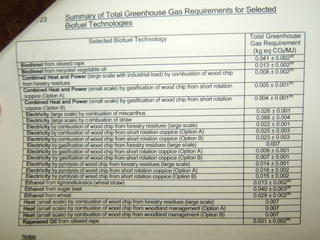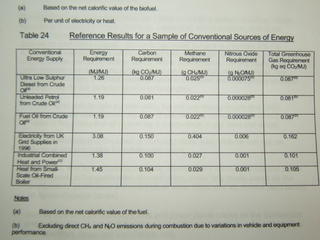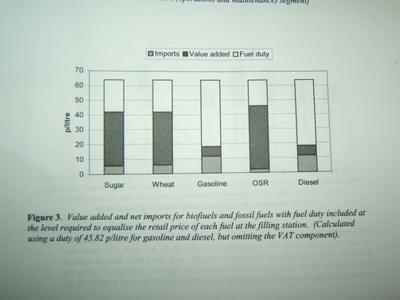
The UK government has set a target of reducing carbon dioxide emissions by 20% from 1990 levels by 2020: are they on track, and if not what would it take to put them back on track? This is the main question posed in the
UK climate policy review. So far the consultations have been submitted, and a outside consultant (IPA) has condensed the 304 responses into a review document. Towards the end of the year the government will make its response to this document. The replyees where: 47 Non-governmental organizations, 41 Public Bodies, 39 Energy Suppliers, 76 businesses, 36 Individuals, 24 Non-Departmental Public bodies and 17 transport sector.The last post on this blog has more link details.
On the question of success so far, many thought existing policies where inadequate and much of the carbon emission reduction in the UK was due to special circumstances, namely the 'dash to gas' when it became more economical to burn gas than coal and the exporting of energy intensive industries, the UK economy moving more towards service industries which are less carbon intensive. The most critical responses where from the academics and NGOs.
TRANSPORT (ROAD/RAIL/AIR)
Many correspondents pointed out that the real cost of motoring had gone down in the past few years despite the rising cost of petrol, this is due partly to a decrease in car prices. It was also pointed out that the transport sector as a whole doesn't have emissions targets! The aviation industry was also the focus of a very high level of attention, it being frequently pointed out that increasing flight numbers would "completely negate" progress made elsewhere. For this reason there was overwhelming support for inclusion of Aviation in the EU ETS during phase 2 (post 2008). An increase in information was a running theme throughout the consultation. It was suggested that airlines should print carbon dioxide equivalents emitted per flight onto tickets. There are also currently several reputable carbon offset projects that satisfy the WWF gold standard, and a scheme whereby airlines follow the polluter pays principle and offset their emissions with one of these companies was also suggested. Aviation was the most popular industry suggested for inclusion into the EU ETS for phase II (33) next was Surface transport (16) and the Aluminium sector (16).
Several organizations also suggested fiscal disincentives for carbon inefficient vehicles such as range rovers.Greater fuel efficency targets for manufacturers where also suggested, these would have to be mandatory as the voluntary scheme has failed, it is widely believed the UK will fail to fulfill its European commitment to reduce the average per km carbon emissions of its car fleet to 140g/km by 2008. There was also strong support for a biofuels obligation. Amongst suggestions for decreasing the amount of carbon emitted by vehicles was a graduated purchase tax, based on carbon emissions, more information on carbon emissions of cars, a phasing out of inefficient vehicles and restrictions on who can own a range rover i.e only those who live in the country or use it for work. By far the most popular suggestion, however, was for a steep increase in the gradient of road tax, to widen the difference between those driving efficient and those driving inefficient, cars. A higher fuel duty was also encouraged by several groups, aslong as the money was put directly back into public transport.
A significant improvement of planning policy was also suggested by a very large number of people, particularly not building housing estates without footpaths/cyle paths to nearby schools and amenities.
HOMES
Many of the suggestions for homes are where not explicitly directed towards developing a distributed energy system but where wholly in line with what such a system would require. For homes the key issues where how to expand micro generation into an increasing number of homes, and how to insure that full advantage is taken of the savings potential of the housing stock. It was suggested by several groups that all new houses should have some sort of micro-generation incorporated, tougher targets along with better enforcement of building standards where seen as key. Several groups pointed out the research which has shown the poor level of compliance with current building regualtions.It was felt that stringent regulations for the new housing stock would be a permanent asset and be of great value, interestingly if permissible carbon footprint was decreased sufficiently the building would have to be either very well insulated or, possibly the cheaper option, they would have to include some renewable energy source. A large part of the problem, the main part, however is the existing housing stock. VAT should be reduced to zero on all renewable energy systems and insulation to reduce there cost in the short term, this point came up repeatedly. There have been several trials with intelligent metering, where the electricity use is displayed in a public area such as the kitchen, this has been found to be highly successful, greater awareness of the issue of energy conservation is motivational and in psychological terms it has been reported that people started to try and 'out smart' the meter by finding all the energy 'leaks' in their homes, smart metering should therefore be expanded, phasing in smart meters when old ones have to be replaced.A standard assessment procedure where a rebate is given on stamp duty for any energy efficiency measures was also widely supported.
Local government also has has a role to play in climate change mitigation, there is still a large amount of council housing, and these social housing schemes are often at the low end of the energy efficiency scale. Certain councils such as Woking have taken a lead on this problem and developed district heating systems, expanded energy efficiency thrives and encouraged micro renewable renewables. The problem ision n`t helped by the government guidelines on decent housing which describe 50mm of insulation as acceptable, this is five times the current building standards and requires urgent attention. Another idea which was popular with many groups was that of extending the labels currently used for white goods to all electrical goods as well as housing. A certificate on every new hose giving its energy efficiency on a label from A-F would be a powerful phsycological motivator and have very little cost in and of itself. Finally with relation to fiscal incentives, there where a large number of replies which supported a link between council tax and house efficiency ratings.
 INDUSTRY (POWER/STEEL/PHARMASEUTICLAS/CARS ETC...)
INDUSTRY (POWER/STEEL/PHARMASEUTICLAS/CARS ETC...)
The industrial sector as a whole has already made large contributions to the UK climate change policy. There are however, several more, important steps, for the government to take with regard to industry including inclusion of the Aluminium industry in the EU ETS: the third most popular suggested addition to the current EU ETS. The use of heat pumps is a measure particularly important in several industrial processes where such an investment could make very significant energy savings. Continued and increased investment in renewable energy research should be carried out by the government, much more support should be given to novel emerging technologies which may over the long term have vast potential but which are currently being side-lined, such as wave/tidal power and biomass pyrolosis. Several groups pointed out that government schemes are two short in there duration to support technologies which are not very close to already being economically viable. Funding should be provided for numerous demonstration projects, these can also provide a focus for education of the young on energy issues.
Many people also felt that the government should be more active in working with the energy industry to insure that coal-fired power stations are either totally removed from the UK energy portfolio, or are replaced with carbon capture plants which store the carbon dioxide in underground reserves such as the north sea oil fields. The UK electricity regulator OFGEM and the new electricity transmission arrangements (NETA) are also widely renounced as outdated and in urgent need of reform. Currently the best NETA could accomplish would be a good solution to the wrong problem, the whole scheme is based on large inefficient centralized energy generation. With the highly popular and vital switch to a more distributed system and the use promotion of not only micro but also community scale energy systems it seems that a large scale reform is required. There are several problems with OFGEM, not least of which is its very narrow remit, of ensuring 'best value' to the customer. This does not include considerations of environmental costs, it doesn't consider the potential for boosting emerging technologies and it is often at conflict with essential climate policy.
SERVICES SECTOR (SHOPS/RESETERAUNTS/CINEMAS ETC...)
Many responses where critical of the disproportionate burden placed on industry in government climate policy so far. A large number of replies, from across the board suggested that some of the easiest won carbon saving now exist in the commercial sector. Amongst the suggestions for rectifying this problem where, extension of the
Energy Efficiency Commitment (EEC) to the no-domestic sector, the application of the EU Energy Efficiency of Buildings directive to the commercial sector, and a combined heat and power (CHP) obligation, which would be applied with particular efficientcy to commercial developments.
The numerous pledges of support for a CHP obligation reflect wider calls for a utilization of waste heat (54) and also calls for a waste heat obligation (24). The use of community scale CHP can be highly efficient, due to thermodynamic principles the highest amount of electricity that can be harnessed from a fuel such as gas is around 55% and these levels are being approached in many modern power plants, the amount of energy that can be obtained from a CHP plant, where the 'low grade heat' is also harnessed can be upto 90%. CHP is therefore a nexus of several issues 1. community involvement, 2. council leadership and therefore development of larger, locally appropriate, schemes, 3. reduction in carbon intensity of energy generation and 4. reduction in waste transport as many CHP systems are of relatively small scale and can be co-fired with local waste, this is particularly relevant when it is realized that 1 in 10 trucks currently on the road are transporting waste. The relative density of commercial premises in central locations makes them ideal for town centre district heating systems which can also then be expanded to the local housing stock, Woking borough council are a superb example of how this should be done and how the whole scheme can be self-funding.
The linking of business rates to energy efficiency was also suggested.
COMMENTS ON GOVORNMENT POLICY IN GENERAL
As has been frequently noted during the consultation, growth in aviation has the potential to completely negate gains made elsewhere in the UK emissions reduction strategy, it is therefore vital that this issue is tackled not just by the EU ETS but by other more fiscal measure, costs of travel are currently at unjustifiably low levels.
Many of the potential energy efficiency gains highlighted in the consultation would be encouraged by a
distributed energy system with councils, regional development agencies and the carbon trust working in concert. The distance between mitigation strategy and application has to be lessened, public involvement is key and
Woking borough council have shown us the way!We live in a carbon-constrained environment and this must be recognized as the over-riding consideration in all development. Development wont get us very far without a world to live on.
The UK trade deficit is currently £34bn and growing, thegovernmentt mustrealizee that the main reason for decoupling of GDP fromemissionss as so far seen is the outsourcing of energy intensive industry abroad. Technology transfer is a key requirement of the Kyoto treaty and is not a trivial matter, futher investment is urgently required.
KEY RECOMENDATIONS
1. Measures should be taken to promote utilizationn of waste heat, a renewable heat obligation is seen as the optimal way to accomplish this. Much more has to be done my non-energy intensive sectors, this should include the first point, utilizing community scale CHP form which heat is readily distributed.
2. Car tax should have an increased differential based on carbon emissions. The VAT differential on vehicles should be introduced. There should be an increase in fuel duty, this should be hypothicated for public transport. There should be a biofuels obligation.
3. Aviation should be included in the EU ETS, Air Passenger Duty should be increased. Aircraft fuel should be taxed at a level in line with other sectors.
4.Household energy efficiency standards should be increased and, just as importantly, more inspections should take place to ensure existing standards are met. Efficentcy labeling should be extended to more household appliances. Planning should be done from a energy use perspective, taking into consideration distances to local amenitiess and foot and cycle paths should be built. A stamp duty rebate should be introduced to compensate people for spending on energy efficiency when they get a new home.
Labels: biofuels
 Home
Home


 del.icio.us
del.icio.us

 Digg This!
Digg This!


















